 1 citations,
August 1946 in “Archives of dermatology”
1 citations,
August 1946 in “Archives of dermatology” The meeting highlighted the complexity and variability of skin conditions and differing opinions on their diagnoses and treatments.
 September 2023 in “Cureus”
September 2023 in “Cureus” Nails can reveal important health information about skin and body conditions.
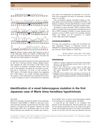 6 citations,
January 2013 in “The Journal of Dermatology”
6 citations,
January 2013 in “The Journal of Dermatology” Researchers found a new genetic mutation causing a rare hair loss condition in the first Japanese child studied.
 47 citations,
July 2004 in “Journal of Dermatological Science”
47 citations,
July 2004 in “Journal of Dermatological Science” Hair loss in balding individuals is linked to changes in specific hair growth-related genes.
October 2021 in “European journal of cancer” Repeated biopsies are crucial for managing lupus panniculitis when initial treatments fail.
 8 citations,
May 2019 in “Journal of dermatological treatment”
8 citations,
May 2019 in “Journal of dermatological treatment” Vismodegib is effective for basal cell carcinoma but has severe side effects.
7 citations,
April 1996 in “Archives of dermatological research” Topical tacalcitol can treat psoriasis by acting directly on skin cells.
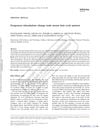 2 citations,
October 2010 in “Journal of dermatological treatment”
2 citations,
October 2010 in “Journal of dermatological treatment” External treatments can change hair growth patterns in nude mice.
 44 citations,
November 2011 in “The Journal of Dermatology”
44 citations,
November 2011 in “The Journal of Dermatology” New understanding of the causes of primary cicatricial alopecia has led to better diagnosis and potential new treatments.
 7 citations,
March 2017 in “Journal of dermatology”
7 citations,
March 2017 in “Journal of dermatology” The conclusion is that accurately identifying folliculosebaceous tumors requires understanding their clinical signs and microscopic features.
 20 citations,
January 2019 in “Journal of dermatological science”
20 citations,
January 2019 in “Journal of dermatological science” Male hormones indirectly affect skin cell development by increasing growth factor levels from skin fibroblasts.
 August 2024 in “Archives of Dermatological Research”
August 2024 in “Archives of Dermatological Research” Combining botulinum toxin type A with Minoxidil significantly improves hair growth and patient satisfaction in male hair loss.
 62 citations,
June 2015 in “The Journal of Dermatology”
62 citations,
June 2015 in “The Journal of Dermatology” People with alopecia areata have more Th17 cells and fewer Treg cells, which may be key to the condition's development.
 25 citations,
March 2017 in “Archives of Dermatological Research”
25 citations,
March 2017 in “Archives of Dermatological Research” Sinapic acid may help hair growth by activating a specific cell pathway.
 17 citations,
July 1994 in “Journal of Dermatological Science”
17 citations,
July 1994 in “Journal of Dermatological Science” The cause of alopecia areata is likely a mix of genetics, immune system issues, and environmental factors, with more research needed to understand it fully.
 4 citations,
July 2020 in “Journal of Dermatological Treatment”
4 citations,
July 2020 in “Journal of Dermatological Treatment” Minoxidil injections can speed up hair regrowth in non-severe patchy hair loss, but combining it with steroids doesn't improve results.
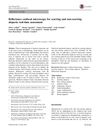 17 citations,
May 2016 in “Archives of Dermatological Research”
17 citations,
May 2016 in “Archives of Dermatological Research” Reflectance confocal microscopy can help tell apart scarring from non-scarring hair loss.
 39 citations,
August 2016 in “Journal of Dermatological Treatment”
39 citations,
August 2016 in “Journal of Dermatological Treatment” Stem cell therapy may help treat tough hair loss cases.
 12 citations,
November 2020 in “Journal of Dermatological Science”
12 citations,
November 2020 in “Journal of Dermatological Science” Found microRNA differences in hair cells, suggesting potential treatment targets for hair loss.
 2 citations,
May 2020 in “Anais brasileiros de dermatologia/Anais Brasileiros de Dermatologia”
2 citations,
May 2020 in “Anais brasileiros de dermatologia/Anais Brasileiros de Dermatologia” Primary health care in Florianópolis mostly treated simple skin conditions, while secondary care handled more complex skin diseases.
 38 citations,
June 2017 in “The Journal of Dermatology”
38 citations,
June 2017 in “The Journal of Dermatology” Aging in hair follicle stem cells leads to hair graying, thinning, and loss.
 68 citations,
September 2003 in “British Journal of Dermatology”
68 citations,
September 2003 in “British Journal of Dermatology” Shrinking skin cancer increases the chance of cancer in nearby lymph nodes.
 6 citations,
April 2010 in “Journal of Dermatological Science”
6 citations,
April 2010 in “Journal of Dermatological Science” Laminin-511 may help promote hair growth, while laminin-332 does not affect hair loss.
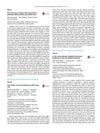 September 2016 in “Journal of dermatological science”
September 2016 in “Journal of dermatological science” Adult skin cells can be used to create new hair in a lab.
 47 citations,
March 2016 in “Journal of dermatology”
47 citations,
March 2016 in “Journal of dermatology” Understanding the genetics of rare inherited ichthyosis syndromes is key for better treatments and genetic counseling.
 51 citations,
February 2009 in “Journal of dermatological science”
51 citations,
February 2009 in “Journal of dermatological science” Pitx2 helps outer root sheath cells differentiate but can't start hair growth on its own.
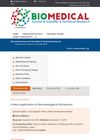 4 citations,
November 2019 in “Biomedical Journal of Scientific and Technical Research”
4 citations,
November 2019 in “Biomedical Journal of Scientific and Technical Research” The document concludes that the acoustic coupler SF-001 is good for skin ultrasound, especially on rough body parts, because it's stable and shows blood vessels well.
 July 2004 in “British Journal of Dermatology”
July 2004 in “British Journal of Dermatology” The document concludes that accurate diagnosis and treatment are crucial in dermatology, and it presents various findings on skin conditions and treatments.
 11 citations,
October 2018 in “The Journal of Dermatology”
11 citations,
October 2018 in “The Journal of Dermatology” Decorin helps keep hair follicle stem cells and may prevent age-related hair loss.
 1 citations,
March 2012 in “Journal of Dermatological Science”
1 citations,
March 2012 in “Journal of Dermatological Science” Testosterone, progesterone, and levonorgestrel change enzyme levels related to fat production in hamster skin, which could affect skin oil and acne.




























